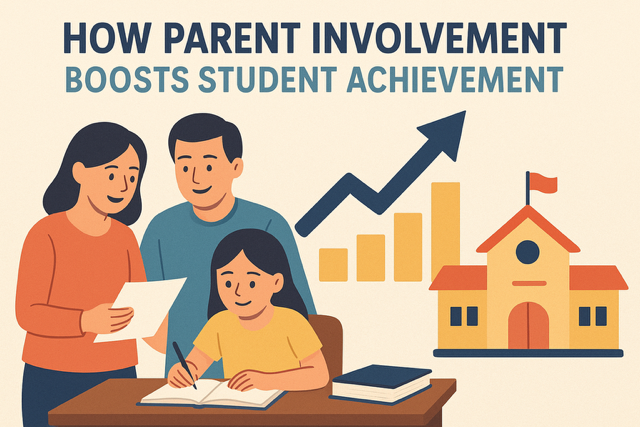
DISCOUNTED EDUCATION PRICING! CALL 1-877-891-8411. We Gladly Accept School Purchase Orders!

Parent involvement in education is a powerful driver of student success. When parents actively participate in their child’s learning journey, the impact is profound—higher grades, improved attendance, better behavior, and a stronger foundation for lifelong learning. This blog explores the transformative effects of parental engagement on student achievement, supported by research, expert insights, and actionable strategies for parents. By understanding the role of parent involvement in academic success, families can unlock their child’s full potential. This comprehensive guide also includes practical tips and a new section on leveraging technology to enhance parental engagement.
Parent involvement includes a variety of actions, from attending school events and helping with homework to fostering open communication and setting high expectations. A 2008 meta-analysis by William H. Jeynes found that parental involvement significantly correlates with higher academic achievement across all grade levels, regardless of socioeconomic status, race, or school type.
Key Fact: Students with involved parents are 30% more likely to earn higher grades and 20% more likely to graduate high school on time (National Education Association, 2019).
Parental engagement creates a supportive ecosystem where students feel valued and motivated. It strengthens the connection between home and school, reinforcing learning and fostering accountability.
Active parental involvement directly enhances academic outcomes. A 2014 study by the Harvard Family Research Project showed that parental involvement in education boosts student achievement in core subjects like math and reading. Engaged parents help children develop study habits, reinforce classroom lessons, and cultivate a growth mindset.
Snippet: Parental involvement in education boosts student achievement by fostering consistent study habits and reinforcing classroom learning.
For example, parents who review assignments or discuss schoolwork with their children help solidify concepts, leading to higher test scores and better knowledge retention.
Beyond academics, parent involvement supports social and emotional growth. A 2020 study in the Journal of Child and Family Studies found that parent engagement in school activities reduces behavioral issues and boosts self-esteem.
Snippet: Parent engagement in school activities reduces behavioral problems and enhances student confidence.
By participating in school events or volunteering, parents model positive social behaviors, helping students navigate peer relationships and build resilience.
Students with involved parents are more likely to attend school regularly and stay motivated. According to the National Center for Education Statistics (2021), students with engaged parents have a 15% lower absenteeism rate. Parental interest fosters a sense of purpose and accountability in students.
Snippet: Parent involvement in student success leads to better attendance and increased motivation.
For instance, parents who establish routines for homework and bedtime create structure, reducing tardiness and absences.
Parental involvement sets the stage for future success. A 2017 study by the National Institute of Child Health and Human Development found that parental support for education increases the likelihood of students pursuing higher education. Engaged parents guide students in setting goals, exploring career paths, and navigating college applications.
Snippet: Parental support for education enhances college readiness and long-term academic success.
By fostering a college-going culture at home, parents prepare students for post-secondary opportunities.
Parent involvement doesn’t require grand efforts—small, consistent actions can yield significant results. Here are practical ways parents can boost student achievement:
Open communication with teachers fosters collaboration. Attend parent-teacher conferences, ask about your child’s progress, and stay informed about classroom expectations.
Snippet: Effective parent-teacher communication for student success strengthens the home-school connection.
Set up a quiet, organized space for homework and study. Limit distractions like excessive screen time and establish a consistent routine.
Snippet: Creating a learning-friendly environment at home for kids promotes academic success.
Participate in school events like science fairs, sports days, or parent-teacher association (PTA) meetings. Volunteering demonstrates that education is a priority.
Snippet: Parent participation in school activities boosts achievement by showing students that education matters.
Praise effort over results to build resilience. Discuss challenges openly and help your child view setbacks as learning opportunities.
Snippet: Encouraging a growth mindset in students builds resilience and motivation.
Express confidence in your child’s ability to succeed while setting achievable goals. Research shows that parental expectations for academic success strongly predict student outcomes.
Snippet: Parental expectations for academic success drive student motivation and achievement.
In today’s digital age, technology offers innovative ways for parents to stay engaged in their child’s education. Schools increasingly use online platforms, apps, and tools to facilitate communication and provide resources. By leveraging these edtech tools, parents can stay informed and actively support their child’s learning, even with busy schedules.
Many schools use platforms like ClassDojo, Remind, or Google Classroom to share updates, assignments, and grades. Parents can monitor progress, communicate with teachers, and receive real-time notifications about school events.
Snippet: Using school apps for parent involvement keeps parents connected to their child’s education.
Apps like Khan Academy, Duolingo, or Quizlet offer interactive learning opportunities that parents can use to supplement classroom instruction. These tools make learning engaging and accessible at home.
Snippet: Educational apps for parent-child learning enhance academic engagement at home.
With hybrid and virtual learning on the rise, schools often host online workshops, webinars, or parent meetings. These events allow busy parents to engage without needing to attend in person.
Snippet: Virtual parent involvement in education offers flexible ways to stay engaged.
While technology is a powerful tool, parents should guide their children in using it responsibly. Set boundaries for recreational screen time and encourage the use of educational platforms.
Snippet: Managing screen time for student success ensures technology supports learning.
By integrating technology into their involvement strategy, parents can stay connected and enhance their child’s academic experience in meaningful ways.
Some parents face obstacles like time constraints, language barriers, or lack of confidence. Here’s how to address them:
Snippet: Overcoming barriers to parent involvement in education ensures every family can contribute to student success.
Schools play a pivotal role in encouraging parent engagement. By creating welcoming environments and offering flexible opportunities, schools empower parents to participate.
Snippet: Schools fostering parent involvement in education create stronger partnerships for student success.
Consider Maria, a single mother who noticed her son Javier’s declining grades. By attending school events, volunteering at the library, and using a school app to track assignments, Maria helped Javier improve his reading scores by 25% in one year. This example highlights how parent involvement in student success can transform outcomes.
Snippet: Parent involvement in student success can lead to significant academic improvements, as seen in real-life examples.
Parent involvement is a catalyst for student achievement. From better grades and attendance to stronger social skills and college readiness, the benefits are far-reaching. By fostering communication, creating supportive environments, leveraging edtech technology, and collaborating with schools, parents can unlock their child’s potential. Start small, stay consistent, and watch your child thrive.
Call to Action: Get involved today! Attend a school event, explore an educational app, or simply ask your child about their day. Every step counts toward their success.